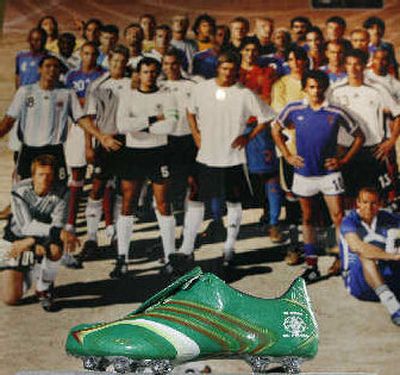A major marketing goal

PORTLAND, Ore. — On a dusty soccer field in a working-class neighborhood in Barcelona, Spain, two youngsters piece together their dream team of superstars for the World Cup.
“Cisse. Kaka. Zidane. Beckham …”
As they do, the actual players trot from around corners onto the field where the boys, who might be 12, form them into squads.
“Impossible Team,” Adidas’ Spanish-language World Cup advertisement, is fantasy. But no Spanish skills are needed, and it’s being aired worldwide.
The bait is a universal love of the game. The stakes are staggering as companies lunge for a slice of the Hispanic market in the United States during the once-in-four-years blowout June 9-July 9, this time in Germany.
Across town from Adidas’ North American headquarters, at Nike Inc., which sells $1.5 billion a year in soccer shoes, apparel and related items, the appetite for sales to the soccer-loving Hispanic population in this country is just as keen.
“We consider that we have two national teams, Mexico and the United States,” said Nike spokesman Nate Tobecksen. He added that Nike, which has contracts with both teams, sells more jerseys in this country for the Mexican team than for the American squad.
Nike pre-Cup activities have included a 70-foot-tall replica of a Mexican team jersey in Los Angeles, with people invited to sign it and wish the team luck. Members of Mexico’s national team are made available to meet with American fans.
Nike has partnered with Google for a 14-language initiative, “Jogo Bonito” — “Play Beautiful” in Portuguese — a campaign that highlights defending champion Brazil, and Eric Cantona, Manchester United’s “player of the century” in 2000.
Tens of millions of fans have logged on; online Jogo tournaments began in February.
While many advertisers chasing the Hispanic market in the United States are saving their best shots for the games themselves, activity is picking up.
On the Spanish-language TV network Univision, which will broadcast the entire World Cup, a player inside a glass of Miller Lite kicks a soccer ball that arcs gracefully among the bubbles. A Home Depot ad reminds viewers that “Your house is your playing field,” and advises getting it fixed up for a summer of soccer. TNS Media Intelligence estimates World Cup revenue for Univision, the largest Spanish-language TV network in the United States, will be $200 million, although not all of it is new money.
The window is brief, the stakes are massive, the target is fast moving and those who follow it say, in effect, that people who want to reach today’s Hispanic market had better not try it in an outmoded way.
There are roughly 42 million Hispanics in the United States. Four of the six Spanish-speaking World Cup countries this year have fewer people than that.
Advertisers spent $3.3 billion going after $800 billion worth of Hispanic spending power in the United States in 2005, and the World Cup concentrates that market.